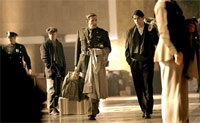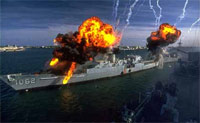
 |
Pearl Harbor (2001) Directed by Michael Bay Cast: Ben Affleck, Josh Hartnett, Kate Beckinsale, Alec Baldwin, John Voight, Dan Aykroyd, Cuba Gooding Jr., William Lee Scott, James King, Tom Sizemore, Mako, Catherine Kellner, Sara Rue, Jennifer Garner, Colm Feore, Ewan Bremner, Greg Zola. 2001 – 183 minutes Rated: Reviewed by Dustin Putman, May 25, 2001.  Telling a love story amidst a tragic, historical backdrop isn't a new conceit. In 1998, James Cameron's "Titanic" captured the attention of audiences everywhere to make it not only the highest-grossing film in history, but also the Oscar winner for Best Picture. "Titanic" was clearly the most notable model for director Michael Bay (1998's "Armageddon") and screenwriter Randall Wallace (1995's "Braveheart") when they set out to make the $135-million, 3-hour-plus "Pearl Harbor." Unfortunately, all of its striking similarities only serve to expose "Pearl Harbor" for what it really is: a pale imitation of a brilliant, modern-day classic.
Telling a love story amidst a tragic, historical backdrop isn't a new conceit. In 1998, James Cameron's "Titanic" captured the attention of audiences everywhere to make it not only the highest-grossing film in history, but also the Oscar winner for Best Picture. "Titanic" was clearly the most notable model for director Michael Bay (1998's "Armageddon") and screenwriter Randall Wallace (1995's "Braveheart") when they set out to make the $135-million, 3-hour-plus "Pearl Harbor." Unfortunately, all of its striking similarities only serve to expose "Pearl Harbor" for what it really is: a pale imitation of a brilliant, modern-day classic. Rafe McCawley (Ben Affleck) and Danny Walker (Josh Hartnett) are top-notch bomber pilots, circa 1941, who have been best friends since their Tennessee-based childhood. Their life is changed with an encounter with beautiful nurse Evelyn Johnson (Kate Beckinsale). Rafe is clearly smitten, and after a glorious four weeks together, they are hopelessly in love. Soon, Rafe is gone to Great Britain to participate in combat, only to end up presumed dead after his plane is shot down. Turning to each other for comfort, Danny and Evelyn, now stationed at Pearl Harbor in Hawaii, begin their own romance, not yet knowing that Rafe is alive, after all. By the time Rafe walks back into their lives, causing turmoil in each of their respective relationships, December 7, 1941--"a date that will live in infamy"--is about to begin.
Rafe McCawley (Ben Affleck) and Danny Walker (Josh Hartnett) are top-notch bomber pilots, circa 1941, who have been best friends since their Tennessee-based childhood. Their life is changed with an encounter with beautiful nurse Evelyn Johnson (Kate Beckinsale). Rafe is clearly smitten, and after a glorious four weeks together, they are hopelessly in love. Soon, Rafe is gone to Great Britain to participate in combat, only to end up presumed dead after his plane is shot down. Turning to each other for comfort, Danny and Evelyn, now stationed at Pearl Harbor in Hawaii, begin their own romance, not yet knowing that Rafe is alive, after all. By the time Rafe walks back into their lives, causing turmoil in each of their respective relationships, December 7, 1941--"a date that will live in infamy"--is about to begin. The thought of Michael "bang-bang-blow-things-up" Bay attempting a serious-minded, historical motion picture was disconcerting, at first. Bay, whose strong suit is most definitely not realism and three-dimensional characters, is acclaimed for making "popcorn" movies with quick edits and non-stop action, not a historical recreation of one of the most distressing occurrences in U.S. history. "Pearl Harbor" could have been a filmed disaster of a real-life disaster. It could have been an embarrassment for all of the creative forces involved in its production. And, most of all, it could have stood as a terrible, Hollywoodized disservice to a slice of American history. It turns out that it is, thankfully, none of these things, although it does have its own problems.
The thought of Michael "bang-bang-blow-things-up" Bay attempting a serious-minded, historical motion picture was disconcerting, at first. Bay, whose strong suit is most definitely not realism and three-dimensional characters, is acclaimed for making "popcorn" movies with quick edits and non-stop action, not a historical recreation of one of the most distressing occurrences in U.S. history. "Pearl Harbor" could have been a filmed disaster of a real-life disaster. It could have been an embarrassment for all of the creative forces involved in its production. And, most of all, it could have stood as a terrible, Hollywoodized disservice to a slice of American history. It turns out that it is, thankfully, none of these things, although it does have its own problems.The movie can easily be divided into three sections, with each offering up varying degrees of success. The opening 90 minutes lay out the development and basic groundwork for the three central characters--Rafe, Danny, and Evelyn--as their unfortunate love triangle falls into place. The disastrous Japanese attack on Pearl Harbor takes up the next 35-40 minutes of screen time, as we follow each character's heroic role in the battle. And the remaining 50 minutes bring us back to settle the love story, as the aftermath of the Pearl Harbor attack is dealt with and General Dolittle (Alec Baldwin) puts into effect the 1942 raid on Tokyo. The tragic, powerful love story of "Titanic" was so very effective because it dealt with characters who were deeply involved in the sinking of the cruise liner, and whose relationship and lives were changed because of it. Jack and Rose, played by Leonardo DiCaprio and Kate Winslet, stood for all of the passengers aboard the fateful maiden voyage of Titanic, and therefore, they meant a great deal more to the viewer. In "Pearl Harbor," the love triangle that arises does not garner the same potency, due to the flawed screenplay, and the fact that the outcome of the relationship has literally nothing to do with what happened at Pearl Harbor. The romance simply is not very convincing, and occasionally clangs with the real-life accounts of the months leading up to World War II. In the world that writer Randall Wallace inhabits, human beings say things like, "Every time I see a sunset, I'll think of you," and "You've captured my heart." The dialogue is intermittently so cringe-inducing that you feel bad for the actors who have to utter those howlers, followed by a period of time in which you question why they didn't laugh at Wallace and tell him to rewrite it to match what real people might naturally say. Whenever one of the protagonists says such cheeseball lines, which luckily isn't so often that it completely destroys the movie's dignity, it sends the whole romance angle into jarring orbit. More strong is the friendship between Rafe and Danny, whose bond ultimately can't be broken by the conflict of a woman in the middle. As portrayed by Ben Affleck (2000's "Bounce") and Josh Hartnett (2001's "Town & Country"), the outcome of their relationship is far more poignant and compelling than that of them and Evelyn, because the platonic love that they share for one another is so honestly felt. All three main performers should be commended for taking what could have been stock roles, and turning them into seemingly real people, even when they are saying silly lines. Affleck's Rafe is a little too smarmy at the onset, but the view of him gradually warms up as the film progresses, and Affleck does well with his cocky charm. Josh Hartnett is even better as good-ol'-boy Danny, whose quiet, unforced innocence is unmistakably engaging. Rounding out the trio, Kate Beckinsale (1999's "Brokedown Palace") brings an intelligent sweetness to Evelyn that could be superior to both of her male counterparts. It is too bad, then, that her part of the story--that of the love story--works the least successfully. In supporting roles, James King (2001's "Blow") and William Lee Scott (2000's "Gone in Sixty Seconds") are very good as a fellow nurse and fighter who fall head over heels for one another, with ill-fated results. Jon Voight (1999's "Varsity Blues") is emphatic as wheelchair-bound President Franklin Roosevelt, while Alec Baldwin (2000's "State and Main"), Dan Aykroyd (2000's "Loser"), and Mako (1997's "Seven Years in Tibet") make equally memorable impressions. On the flip side, Cuba Gooding Jr. (2000's "Men of Honor"), whose role of a real-life cook on one of the U.S. ships at Pearl Harbor who shot down two Japanese fighter jets, is superfluous and far too brief to make a notable impact. Gooding Jr. is a fine actor, but his appearance simply pads out the running time an extra ten minutes. The centerpiece of "Pearl Harbor" is, of course, the Japanese invasion, and it does not disappoint. Suspenseful and frighteningly real, this is the one section in which director Bay made the correct choice in not hamming the proceedings up. With stark photography, tight editing, and magnificently rendered visual effects by Industrial Light & Magic, this middle interlude is certainly the highlight for sheer entertainment value. Incidentally, though, it is the only section in need of more palpable emotions. Ships are blown up and countless lives are lost, but viewer reaction to this is oddly mote, perhaps because of how fast it moves from one scene to the next. "Pearl Harbor" is a difficult movie to review. It is in no way a great movie, but it also is far from bad. There is a lot to recommend, from the performances, to the two war sequences, to a climactic scene that is simply heartbreaking, but there are also a fair share of detractors. The film presses on for just over three hours with no clear destination or purpose, and the supposed-to-be cathartic final scenes are hampered by a needless, misguided narration that seems to cheapen the realities of World War II. Nonetheless, the calamitous events that occurred on December 7, 1941 are boldly brought to cinematic life, and it demands to be seen. "Titanic," it surely is not, but "Pearl Harbor" has enough finer points to pass as a good film that could have been better. ©2001 by Dustin Putman |
 |













